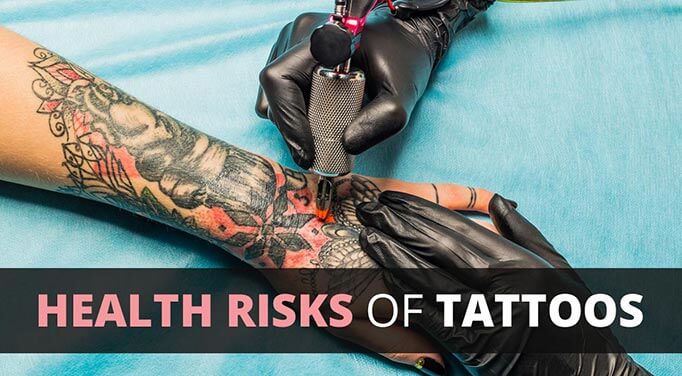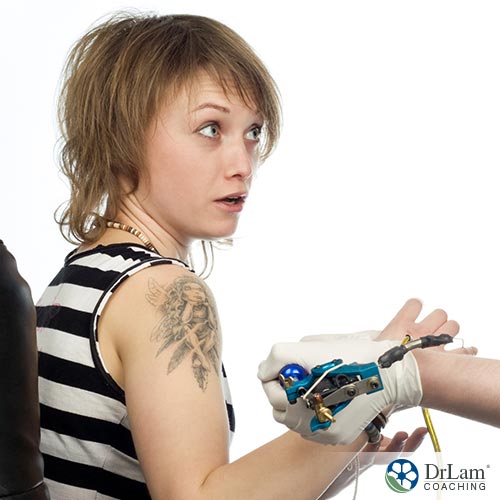 Body tattoos certainly sound cool! But getting one done requires being brave. The first thought that may creep into your mind is the sharp pain—in tattooing, ink is delivered by hundreds of needles that prick your skin. But tattoo health risks aren’t just limited to needle pain. Research has linked body tattoos with an increased risk of various skin problems including allergies and infections. Studies on mice have shown that some ink particles can migrate into the bloodstream reaching deeper parts of the body. Moreover, very few consider what happens to the ink after it’s injected into the layer of skin.
Body tattoos certainly sound cool! But getting one done requires being brave. The first thought that may creep into your mind is the sharp pain—in tattooing, ink is delivered by hundreds of needles that prick your skin. But tattoo health risks aren’t just limited to needle pain. Research has linked body tattoos with an increased risk of various skin problems including allergies and infections. Studies on mice have shown that some ink particles can migrate into the bloodstream reaching deeper parts of the body. Moreover, very few consider what happens to the ink after it’s injected into the layer of skin.
Tattooing involves hundreds of needles pricking your skin. Each prick deposits ink into the dermis—a deeper layer of skin containing nerves and blood vessels. This leads to the chance of ink particles migrating from the dermis into the bloodstream, lymphatic system, and lymph nodes. This is why tattooed people may have enlarged or pigmented lymph nodes, which can interfere with medical scanning reports and could also be mistaken for malign cells.
After getting tattooed, it can take over a month for your skin to heal and become normal again. However, in certain cases, your skin may develop a rash, irritation, or swelling.
According to one study from the Tulane University School of Medicine, over 4 percent of people experience pain for more than a month after getting a tattoo. Furthermore, over 22 percent of the newly tattooed people experience persistent itching that lasts more than a month.
Tattooing can also make your body vulnerable to various skin problems. This can exert additional stress on your body which may lead to fatigue. The NeuroEndoMetabolic (NEM) stress response system is your body’s natural defense system against stress. During stressful situations, it signals to your adrenal glands to secrete the anti-stress hormone cortisol. However, repeated stress overburdens your adrenals which can lead to Adrenal Fatigue Syndrome (AFS). There have been several reports of tattooed people complaining of skin problems and fatigue.
Below are some of the health risks associated with inking:
Tattoo guns are equipped with hundreds of needles to puncture the outermost layer of skin and deposit ink into the dermis. Using unsterilized equipment can lead to infection, which is one of the most prevalent tattoo health risks. Pseudomonas and Staphylococcus aureus bacteria are the most common infections observed from tattooing, and are mainly due to poor equipment sterilization methods or insufficient skin preparation. More serious and life-threatening Staph skin infections have been reported as well.
Serious tattoo-induced infections, such as lupus-like reaction and lichen planus, can last longer and may cause permanent scarring. A study reported in Hepatology has linked tattoo exposure with the hepatitis C virus, which is ten times more infectious than HIV. The virus can be transmitted through the needles used by the tattoo artist.
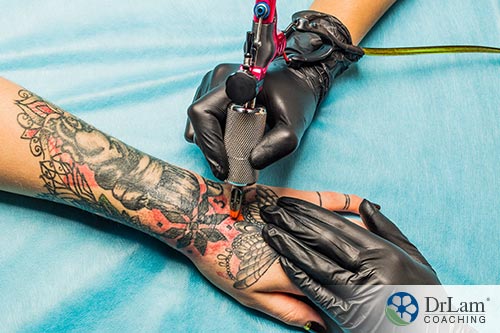 Infections can dysregulate your immune system and inflammation pathways, leading to increased stress and toxic load on your body and adrenal glands.
Infections can dysregulate your immune system and inflammation pathways, leading to increased stress and toxic load on your body and adrenal glands.
Contaminated ink can also pose tattoo health risks. Although the surface of your skin may heal, ink remains trapped in deeper layers of your skin. In fact, studies backed by intensive investigations have linked specific brands of tattoo ink with an increased risk of mycobacterial skin infections.
Tattoo ingredients can lead to allergic reactions. Ingredients may vary depending on color but mercury and nickel are the most common allergens and you should definitely stay away from them. Those suffering from AFS need to take extra care as any exposure to allergens can instantly trigger symptoms. Tattoo ink often contains organic compounds and metals within a liquid base such as purified water.
Developing an allergy to tattoo ink is uncommon. But in certain cases, the dye can cause an allergic reaction in the form of an itchy rash on the skin, which is often difficult to treat and can leave permanent blemishes. People who have experienced no issues with their first tattoo sometimes develop an allergy after getting their second or third one. Surprisingly, there have been reports of this even when the subsequent tattoo was done an entire decade later.
Also, even if no immediate allergic response is noted, you body may react over time.
Tattooed skin is more vulnerable to the effects of prolonged sun exposure. According to studies, over 42 percent of tattooed sunbathers reported adverse reactions in the form of redness, itching, and swelling, and more than half of the complaints were due to sun exposure. The ink pigments may react to sunlight leading to skin problems and toxicity.
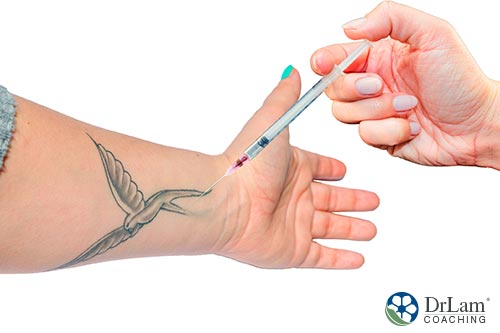 Tattoos covering up extensive areas of skin can also cover up potential skin problems. This can make timely detection of skin issues difficult. There have been reports of permanent body art covering skin cancers including squamous cell carcinomas, basal cell carcinomas, and melanomas. According to one case report, the patient’s melanoma was revealed only after the tattoo was removed by laser treatment. Until then, black ink was covering the cancerous growth. Permanent body art makes it difficult to perform skin checks and to detect moles or other evidence of cancerous growths. This is particularly undesirable since early detection is vital for the successful treatment of skin cancer.
Tattoos covering up extensive areas of skin can also cover up potential skin problems. This can make timely detection of skin issues difficult. There have been reports of permanent body art covering skin cancers including squamous cell carcinomas, basal cell carcinomas, and melanomas. According to one case report, the patient’s melanoma was revealed only after the tattoo was removed by laser treatment. Until then, black ink was covering the cancerous growth. Permanent body art makes it difficult to perform skin checks and to detect moles or other evidence of cancerous growths. This is particularly undesirable since early detection is vital for the successful treatment of skin cancer.
Tattoo pigments are known to interfere with MRI image quality. In rare cases, tattoos can cause swelling or burns during an MRI exam. One case reported burns on the tattooed skin of a professional football player during an MRI exam. The burns may have been caused by the iron found in black tattoo ink, which forms an electric current during MRI. The presence of iron oxide in black ink tattoos increases the risk of MRI complications.
It’s extremely important to ensure the tattoo equipment has been fully sterilized prior to tattooing. Needles contaminated with infected blood can cause various blood-borne diseases including hepatitis B, hepatitis C, and methicillin-resistant Staphylococcus aureus (MRSA).
According to a study conducted at the of Integrative Physiology and Health Science of Alma College, tattooed skin produces less sweat compared to natural skin. In addition, sweat from inked skin contains high concentration of sodium. Tattoos can significantly interfere with your body’s natural cooling system, and may cause fluid and electrolyte imbalances —a key factor in the cardionomic circuit of the NEM stress response.
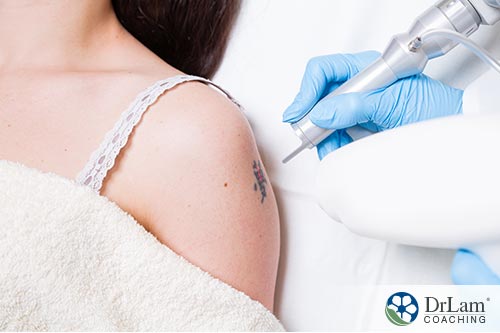 Tattoo needles pierce the skin multiple times to deposit the ink, which often causes scarring. Most of the time you don’t notice the scarring since it’s camouflaged by the ink.
Tattoo needles pierce the skin multiple times to deposit the ink, which often causes scarring. Most of the time you don’t notice the scarring since it’s camouflaged by the ink.
Many people tend to think that tattoo health risks can be avoided by getting rid of their body art. However, the truth is that tattoo removal techniques may be of little help in preventing the associated health risks. As the pigment becomes anchored into deeper layers of your skin, some of the particles reach the lymphatic system and lymph nodes, from where they cannot be removed.
Also, tattoo removal is expensive, painful, and time-consuming, and has its own side effects. Based on the size of your tattoo, it can take multiple sessions to get the ink removed satisfactorily. The removal process involves shattering the pigment particles beneath your skin using a laser and your body subsequently absorbs the ink. As with the actual tattooing process, spreading of the ink, infected tissue, burns, and scarring are all causes for concern. These can all lead to inflammation and more stress on your body.
Large tattoos can be difficult to tackle in a single session. In certain cases, they may even take years to remove. Other complications include fibrosis—thickening of the skin at the tattoo site—and hypopigmentation, which can cause white spots on the tattooed area. The removal process can be made easier by using FDA-approved micro-encapsulated ink. The pigment is quickly destroyed as it is hit by the laser. Permanent body art done using this type of ink is less permanent thus minimizing tattoo health risks.
Getting a tattoo may sound like the most exciting thing in the world. But as permanent body art gains more popularity, tattoo health risks are rarely spoken about. Several studies have linked tattoos with an increased risk of skin problems. Hundreds of needles pierce through your skin to inject the ink exposing your body to various infections and allergies. Although the pigment is only deposited into the dermis—a deeper layer of your skin—some of the particles may flow into your bloodstream, enter the lymphatic system, and settle in the lymph nodes. This may lead to enlarged or pigmented lymph nodes, making them appear as malign cells. Tattooing increases your risk of skin infections, allergies, and scarring. It can also interfere with MRI scans and detecting skin cancer as cancerous growths may be camouflaged by the ink. Tattoo health risks can place your body under stress and could contribute to Adrenal Fatigue.
© Copyright 2018 Michael Lam, M.D. All Rights Reserved.
Not getting tattooed in the first place is the best way to avoid tattoo health risks. However, if you have your heart set on a tattoo, make sure you consider some of these important facts before inking. It’s essential to use new tattoo needles, sterilized equipment, and tattoo inks free of harmful materials. Allow the skin to heal after tattooing and be sure to initially avoid sun exposure.
